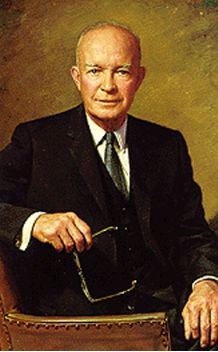Remembering the Eisenhower Doctrine
More on:

Today marks the fifty-fifth anniversary of President Dwight D. Eisenhower’s speech enunciating what came to be known as the “Eisenhower Doctrine.” On January 5, 1957, Ike addressed a joint session of Congress and asked it to authorize $200 million for the United States to provide economic and military assistance to Middle East countries requesting aid against “overt armed aggression from any nation controlled by International Communism.”
This was a lot of money in those days (and still is!) but Eisenhower argued that the region was in danger of falling under Moscow’s sway, and Congress soon after authorized the request. Having helped lead the charge in the United Nations just two months earlier to roll back the tripartite Anglo-French-Israeli invasion of Suez, the United States now declared its own willingness to intervene militarily in the region.
Some historians argue that Eisenhower’s effort was an attempt to resist Soviet advances without involving the United States in regional entanglements. If so, it was an abject failure--the United States has been involved in local entanglements ever since. Eisenhower invoked the anti-Soviet doctrine to provide economic aid to shore up the Jordanian kingdom, to encourage Syria’s neighbors to topple the Damascus government, and by deploying some 14,000 Marines to Lebanon to help stave off revolution. Today, the Soviet Union is gone, but Washington is still providing economic aid to Jordan, encouraging Syria’s neighbors to work against the Damascus government, and encouraging outside military forces—now UNIFIL—to prevent one element within Lebanon—Hezbollah—from taking over the country.
Historians also differ over the doctrine’s relationship to Arab nationalism. Some argue that it reflected Washington’s failure to recognize the strength of Arab nationalism against the threat of Soviet communism. Others argue that Eisenhower very much recognized the power of Arab nationalism, particularly the variant espoused by Egyptian president Gamal Abdul Nasser. According to this interpretation, Ike was trying to help bolster conservative, pro-Western states from falling under Nasser’s influence.
Both views seem to have merit. At first, Eisenhower seemed to view the region’s developments entirely through the prism of the Cold War. Only with time did the Eisenhower administration come to see that Nasser and Arab nationalism were becoming a regional force to be reckoned with, independent of Moscow. Thus, to frame U.S. interests in the Middle East solely in terms of outside Soviet intervention was to apply too narrow a conceptual framework for considering developments in the region.
Key officials in Washington soon recognized these deficiencies and quietly deemed the doctrine ineffective. Eisenhower’s National Security Council concluded by late 1958 that its approach had posited the United States as Nasser’s opponent and inadvertently bolstered the Egyptian leader’s standing as the champion of Arab nationalism throughout the Middle East. The NSC urged a more selective and nuanced form of engagement in the region, but the administration found it difficult to scale back its more broad-based involvement, and to refrain from couching local conflicts in Cold War terms. In any case, the United States was now fully engaged in the power politics of the Middle East. From then on, policy debates would center on how, not whether, to effect change in the region.
As evidenced by the current escalating rhetoric between Iran and the United States over the Gulf, the fundamental legacy of the Eisenhower doctrine endures, even if the Soviet Union does not: the United States was and still remains committed to upholding its vision of security and stability in the Middle East, and is prepared to employ military force to realize it. The Eisenhower Doctrine signaled the United States’ emergence as the region’s single most influential outside player. Is it still today?
More on:
 Online Store
Online Store